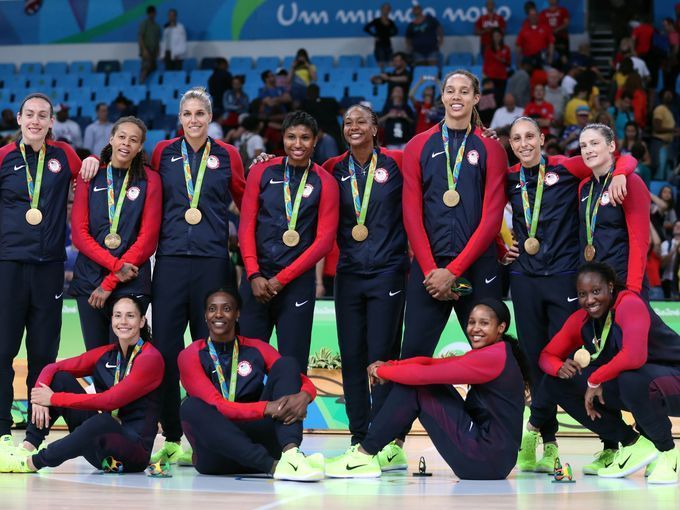Home »
Misc »
How many gold medals has the us olympic basketball team won
How many gold medals has the us olympic basketball team won
History, top teams and all you need to know
Basketball was invented in the United States of America in 1891. But it didn’t take too long for the sport to become popular. Today, it’s one of the most-watched sports in the world.
Its rise can be traced back to its roots in a gym class in Springfield, Massachusetts, making its way into high school and colleges before evolving into a professional sport it is today. Eventually, it made its way to the sport’s grandest events.
When did basketball start in the Olympics?
Basketball was introduced in the Olympic programme at the 1904 Games in St Louis as a demonstration event. Basketball was first contested as a medal event at the 1936 Olympics. Women’s basketball, meanwhile, made its debut at the Montreal 1976 Games.
3x3 basketball made its Olympic debut at Tokyo 2020.
Who qualifies for Olympic basketball?
A total of 12 teams, each in the men’s and the women’s competition, qualify for the basketball event at the Olympic Games.![]()
While seven teams can gain entry through the FIBA World Cup, four slots are determined through the FIBA Olympic qualifying tournament. The last remaining slot is reserved for the hosts.
Which country has won the most Olympic gold medals in basketball?
The United States of America is the most successful team in the history of Olympics basketball.
The USA Olympic men’s basketball team has won the gold medal a record 16 times, which includes an unbeaten streak from 1936 to 1968.
The USA women’s basketball team, meanwhile, has pocketed the gold medal on nine occasions. This includes an unbeaten run that’s still in place and dates back to Atlanta 1996.
USA dominates Olympic basketball
Having invented the sport in the late 1800s, it was no surprise that the USA dominated basketball once it was included as a medal event at the 1936 Olympics.
With the Young Men’s Christian Association (YMCA) playing a key role in spreading the sport to various nations, as many as 21 teams competed for the top honours at the Berlin 1936 Games.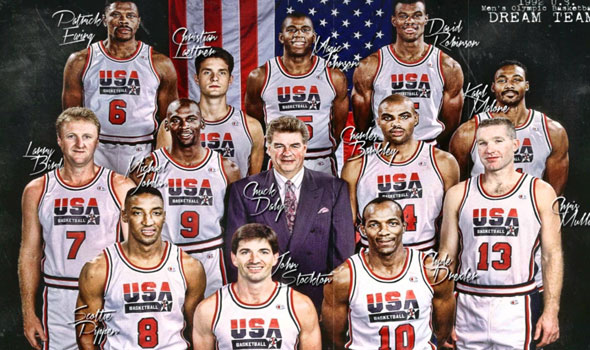
But none could stand in the USA’s way as they romped home to emphatic wins in each of their matches to take home the gold.
The coming years saw the Americans grow stronger as they retained the Olympic title in commanding fashion. With no losses throughout their campaigns, their wins in the gold medal matches were most startling.
The USA basketball team beat France 65-21 in the final of the 1948 Games. The Soviet Union, meanwhile, lost to the Americans in the following four editions -- 1952, 1956, 1960 and 1964 -- with the champions recording dominating wins to retain their crown.
This period also saw the rise of the Soviet Union as a force in the international basketball scene.
The Soviets had made their presence felt at the continental stage by winning the biennial European Basketball Championships 10 times from 1951 to 1971 and the FIBA World Championships in 1972.
And when the 1972 Munich Olympics came around, their sole focus was to capture the only title missing from their cabinet -- an Olympic gold in basketball.
USA gets a shock at Munich Olympics
Coming into the Munich Olympics, the Americans were once again favourites to retain their title. But a look at their build-up suggested otherwise.
They had lost out to the Soviets in the final of the 1970 World University Games and bowed out of the 1971 Pan American Games without a medal.
What really hurt them in this phase was the lack of international experience in the squad. With the Olympic competition being restricted to amateurs, the best hoopsters in America were kept out of the Olympic team -- as they turned pro by joining the NBA -- while the top collegiate talent made up the squad.
Though this worked for the USA in the previous editions, this time the Soviets had found a way to exploit the American limitation by listing their players as soldiers or workers, which allowed them to breach the amateur rules.
This meant while the USA had high school sophomore Doug Collins and the North Carolina State University rookie Tommy Burleson as their best players, the Soviets rode on the brilliance of experienced stars Sergei Belov, Modestas Paulauskas and Alexander Belov.
However, it wasn’t until the gold medal game that the lack of experience came to haunt the USA.
Having come into the gold medal match without losing a game, the final was expected to be a close contest. But the Soviets had a different plan.
The USA lost to the Soviet Union in the final of the 1972 Olympics in Munich.
Picture by Getty Images
The Soviet Union basketball team controlled the proceedings with smart ball play, often using the length of the court to stretch the American defence to score points at will. The Soviets scored first and led by the healthy margin of 26-21 at the half.
“We particularly struggled against the Russians because they were adept at controlling the tempo,” Mike Bantom, a member of the ’72 team, now senior vice president for NBA player development, told the New York Times.
While the Americans mounted a comeback in the second period it wasn’t until the final six minutes that they had their opponents in trouble.
Trailing by eight points, the Americans put pressure and saw the Soviets stumble, helping them reduce the gap to just a point with six seconds left on the clock.
Down to the wire for the gold medal, Doug Collins - the pillar of his team - was not done yet as he made a fine open-court steal and drove towards the paint before being knocked down.
The foul meant the Americans were awarded two free throws to seal the match. While Collins sank them both to put his side ahead, the Soviets called for a time-out.
The game resumed with a second left, and when that went by, the United States players started celebrating. But the drama was not over yet.
Moments later, the FIBA president was seen on court asking for a redo of the final three seconds due to a refereeing error.
This time though, the Soviets ensured that they made the most of the opportunity as Alexander Belov pulled out a buzzer-beater to subject the USA to their first loss at the Olympic stage.
Though the Americans appealed against the final decision, it was turned down as the Soviet Union won their maiden basketball Olympic crown.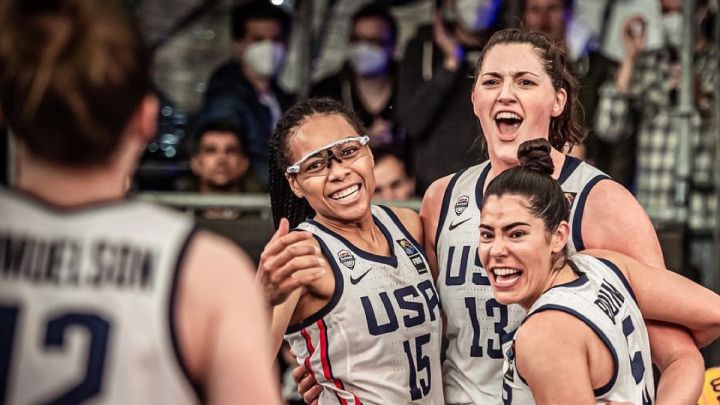
The Dream Team
The coming years also saw a number of countries making the most of the loopholes in the amateur player rule to field top talents at the Olympics.
However, this changed in 1992 after FIBA ruled to include professionals for the Barcelona Olympics.
This allowed the USA to select what was later dubbed as the greatest sports team ever assembled.
The team featured the likes of NBA superstars Michael Jordan, Larry Bird, Magic Johnson, Patrick Ewing, Scottie Pippen and Karl Malone among others.
The Dream Team, coached by Chuck Daly, a two-time NBA champion, had a pre-competition camp in Monaco and then moved into a luxury hotel in Barcelona, where they stayed during the Games.
The Dream Team dominated the Olympic competition, sailing through to win the gold medal. They were the first team to score 100 points in every match at the Games, something that led to their head coach commenting: “It was like Elvis and the Beatles put together.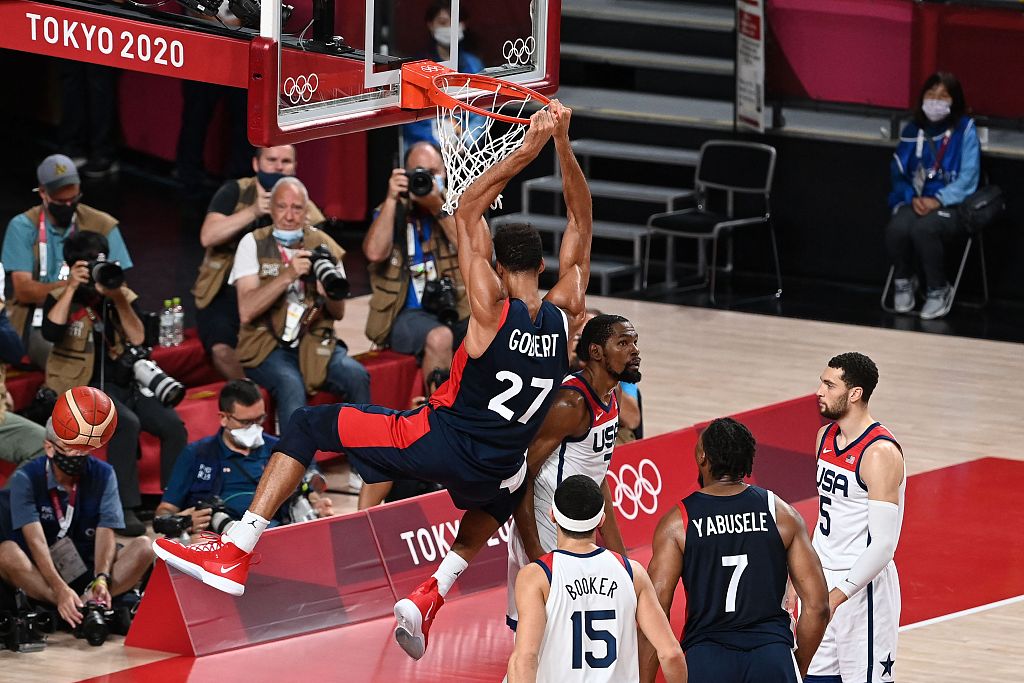 ”
”
However, it’s the legacy that the team left behind that had a lasting impact on the popularity that basketball enjoys today.
Following Barcelona 1992, foreign recruits have been a major draw in the NBA with Yao Ming and Andrea Bargnani being the number one draft picks in (2002) and (2006) respectively. Meanwhile, Dirk Nowitzki and Giannis Antetokounmpo have won the NBA MVP award since.
Olympic basketball winners: Men's
Men's Olympic basketball: All medallists | Olympics | Gold medal | Silver medal | Bronze medal |
|---|
| Berlin 1936 | USA | Canada | Mexico |
| London 1948 | USA | France | Brazil |
| Helsinki 1952 | USA | Soviet Union | Uruguay |
| Melbourne 1956 | USA | Soviet Union | Uruguay |
| Rome 1960 | USA | Soviet Union | Brazil |
| Tokyo 1964 | USA | Soviet Union | Brazil |
| Mexico 1968 | USA | Yugoslavia | Soviet Union |
| Munich 1972 | Soviet Union | USA | Cuba |
| Montreal 1976 | USA | Yugoslavia | Soviet Union |
| Moscow 1980 | Yugoslavia | Italy | Soviet Union |
| Los Angeles 1984 | USA | Spain | Yugoslavia |
| Seoul 1988 | Soviet Union | Yugoslavia | USA |
| Barcelona 1992 | USA | Croatia | Lithuania |
| Atlanta 1996 | USA | Yugoslavia | Lithuania |
| Sydney 2000 | USA | France | Lithuania |
| Athens 2004 | Argentina | Italy | USA |
| Beijing 2008 | USA | Spain | Argentina |
| London 2012 | USA | Spain | Russia |
| Rio 2016 | USA | Serbia | Spain |
| Tokyo 2020 | USA | France | Australia |
Women’s basketball at the Olympics
While the men’s game has enjoyed a storied history under the Olympic banner, women’s basketball has a similarly rich vein of tales to tap into.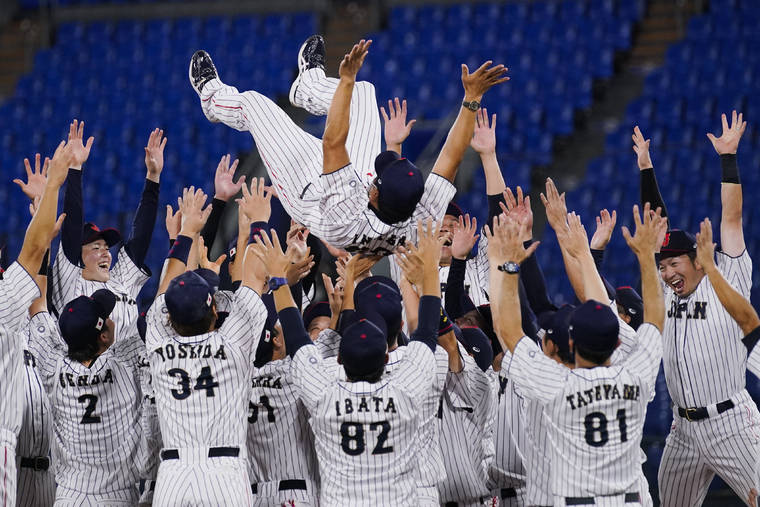
The USA is the most successful team in women's Olympic basketball with eight titles.
Making its debut at the 1976 Games in Montreal, women’s basketball has been a constant presence at the Olympics ever since.
The Soviet Union was the first to claim the Olympic title in the women’s category by beating the United States in the final at the 1976 Games. While the Soviets retained their crown at their home Games in 1980, the Americans took the gold medals in the following two Games.
In 1992, a Unified Team consisting of the former Soviet Republics beat China for the title.
The Americans, however, returned to regain their crown at Atlanta 1996 and have won the title at every edition since.
Olympic basketball winners: Women's
Women's Olympic basketball: All medallists | Olympics | Gold medal | Silver medal | Bronze medal |
|---|
| Montreal 1976 | Soviet Union | USA | Bulgaria |
| Moscow 1980 | Soviet Union | Bulgaria | Yugoslavia |
| Los Angeles 1984 | USA | South Korea | China |
| Seoul 1988 | USA | Yugoslavia | Soviet Union |
| Barcelona 1992 | Unified Team | China | USA |
| Atlanta 1996 | USA | Brazil | Australia |
| Sydney 2000 | USA | Australia | Brazil |
| Athens 2004 | USA | Australia | Russia |
| Beijing 2008 | USA | Australia | Russia |
| London 2012 | USA | France | Australia |
| Rio 2016 | USA | Spain | Serbia |
| Tokyo 2020 | USA | Japan | France |
USA Men's Olympic Basketball Gold Medal Wins
How many Olympic Basketball gold medals has the USA won?The U.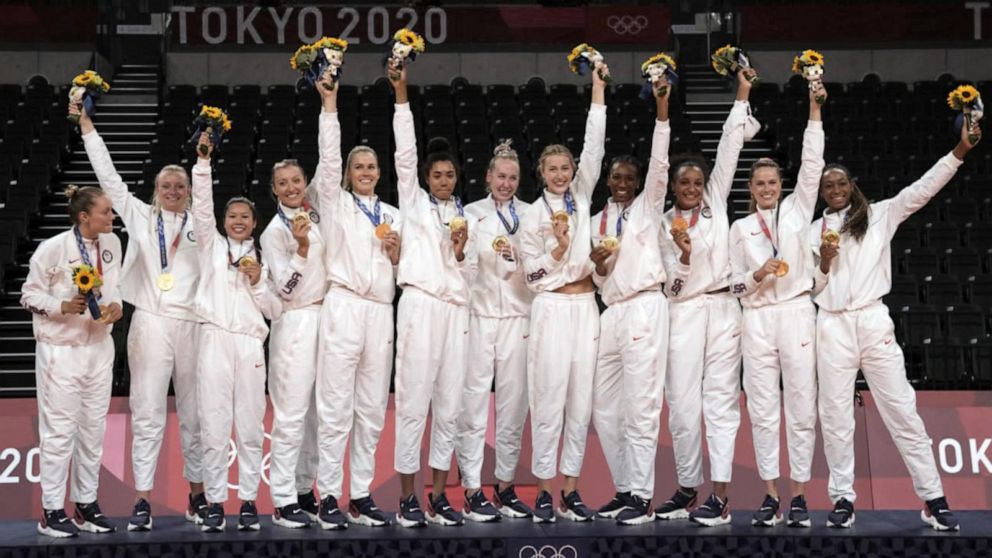 S. men's Olympics Basketball team has won 16 gold medals so far. They have made 19 appearances in the Olympics, out of which they have won a medal each appearance. They have won 16 gold medals, one silver, and two bronze medals. Team USA owns a 145-10 overall win-loss record and 56-4 in exhibition games.
S. men's Olympics Basketball team has won 16 gold medals so far. They have made 19 appearances in the Olympics, out of which they have won a medal each appearance. They have won 16 gold medals, one silver, and two bronze medals. Team USA owns a 145-10 overall win-loss record and 56-4 in exhibition games.
What years did the USA Basketball team win gold medals in the Olympics?The USA Basketball team has won 15 gold medals in the Olympics. They won the gold medal for the years 1936, 1948, 1952, 1956, 1960, 1964, 1968, 1976, 1984, 1992, 1996, 2000, 2008, 2012, 2016 and 2020.
How many Olympic appearances does the USA Basketball team have?The USA Basketball team has made 19 appearances in the Olympics. They have managed to secure a medal in each of their appearances. Out of 19 appearances, they have won 16 gold (1936, 1948, 1952, 1956, 1960, 1964, 1968, 1976, 1984, 1992, 1996, 2000, 2008, 2012, 2016, 2020), one silver (1972) and two bronze medals (1988, 2004).
What team won the last Olympic gold medal in Basketball?Team USA won the gold medal in the last Olympics held in 2020 in Tokyo, Japan. In the gold medal match, USA defeated France, 87-82.
Has the USA Olympic Basketball team lost?The USA Olympic Basketball team's first-ever loss since the sport was introduced in the Olympics (1936 Berlin) was in the 1972 Germany Olympics. They lost the final to Soviet Union 51-50 and it is considered one of the most dramatic events in Olympic history. At the 1988 Summer Olympics in Seoul, USA won the bronze medal in the third place game against Australia, after they lost to Soviet Union 76-82 in the semifinals.
At the 2004 Athens Olympics, the USA men’s team lost three games - Puerto Rico 92, USA 73; Lithuania 94, USA 90; and Argentina 89, USA 81. Their loss to Puerto Rico ended their 24-game Olympic winning streak since 1992. They won the bronze medal that year after their 81-89 semifinal loss to Argentina.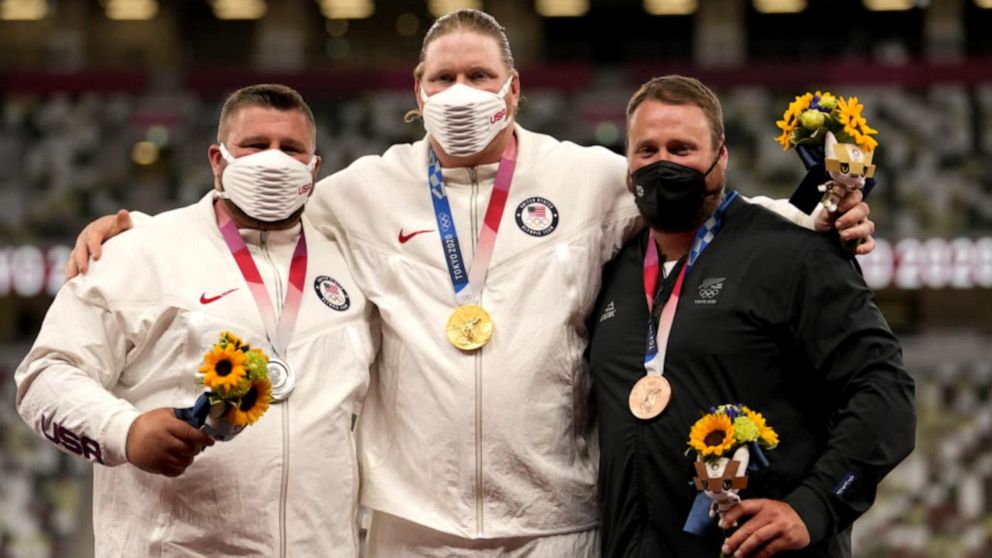 They beat Lithuania 104-96 to clinch the bronze medal.
They beat Lithuania 104-96 to clinch the bronze medal.
Who are the notable NBA players on the 2021 Olympic Basketball team?The entire USA Olympics Basketball roster comprises NBA players. The 12-member U.S. Olympic Men’s Basketball Team will be spearheaded by three-time Olympian Kevin Durant who plays for the Brooklyn Nets in the NBA. Some other notable players are - Jayson Tatum (Boston Celtics), Zach LaVine (Chicago Bulls), Draymond Green (Golden State Warriors), Devin Booker (Phoenix Suns), Damian Lillard (Portland Trail Blazers), JaVale McGee (Denver Nuggets) and Khris Middleton (Milwaukee Bucks). The team's head coach for the 2020 Tokyo Olympics was Spurs legend, Gregg Popovich and the current head coach is Steve Kerr of the Golden State Warriors.
When was the last time the USA lost in Olympic basketball?The last time Team USA lost in Olympic basketball was at the 2004 Athens Olympics where they suffered a loss in three games. They won the bronze medal that year after winning the third place match against Lithuania, 104-96.
They won the bronze medal that year after winning the third place match against Lithuania, 104-96.
Sort by:
GIF
Cancel
GIF
Cancel
Basketball. Women. World Championship 2022. The US team has gold and a ticket to the Olympic Paris 2024
On Saturday, October 1, , the Women's Basketball World Championship 2022 ended in Sydney, Australia. In the final, the US basketball players won a landslide victory over the Chinese team - 83:61, not only winning the gold medals of the tournament, but also officially becoming the first participants in the women's basketball tournament of the 2024 Olympic Games in Paris. Bronze at the 2022 World Cup - for the Australian team, which defeated the Canadian team in the match for third place - 95:65.
The US team won its 11th title at the Women's World Basketball Championships, and it can be said that it won this tournament by a clear advantage: 8 matches - 8 wins, and in none of them did the advantage of American basketball players amount to less than 14 points.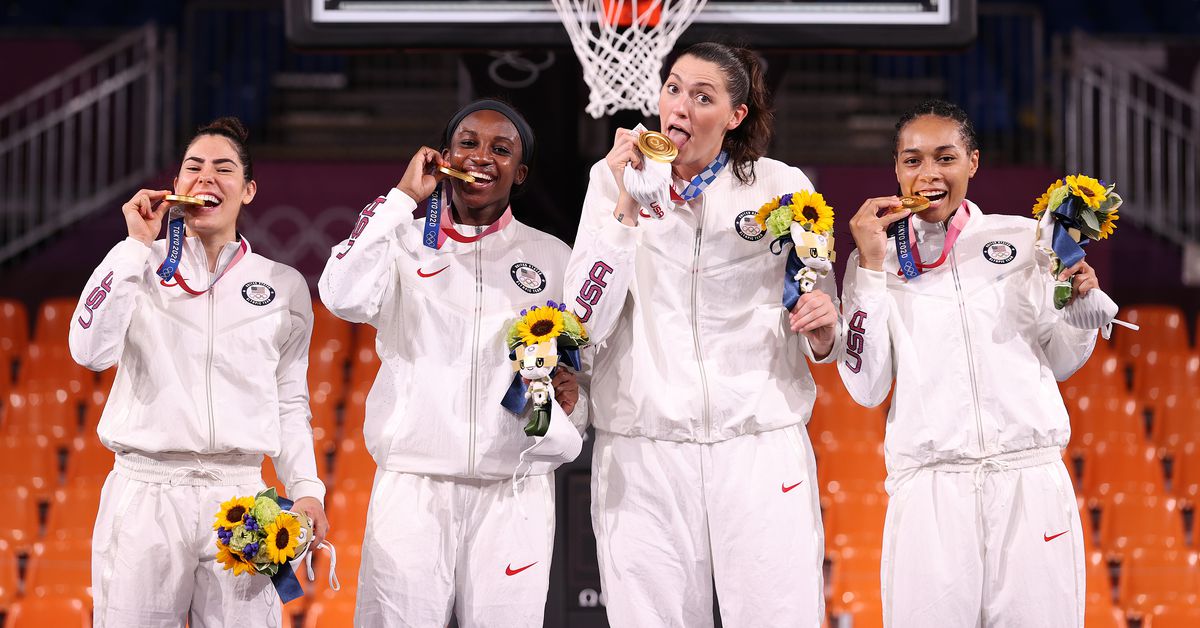 The final against the Chinese team was no exception in this regard, in which the US team dominated throughout the meeting, methodically increasing its advantage in the score, which by the middle of the second quarter had become double-digit. The Chinese team could not oppose anything to the tight and aggressive defense of the American team, which is best evidenced by the ball interception statistics - 13:2 in favor of the US team (after these interceptions, the Americans scored 18 points against 4 points in similar situations for the Chinese). Great match played by the leaders of the US team - Agea Wilson and Kelsey Plum , scoring 19 and 17 respectively. As part of the Chinese team, only the young center Li Yueru , who made a “double-double” (19 points and 12 rebounds), can take this match into an asset. However, this achievement can be considered her personal groundwork for the future, since in general the advantage of the US team over rivals in the class was simply overwhelming - both in this particular final and in the entire current World Cup.
The final against the Chinese team was no exception in this regard, in which the US team dominated throughout the meeting, methodically increasing its advantage in the score, which by the middle of the second quarter had become double-digit. The Chinese team could not oppose anything to the tight and aggressive defense of the American team, which is best evidenced by the ball interception statistics - 13:2 in favor of the US team (after these interceptions, the Americans scored 18 points against 4 points in similar situations for the Chinese). Great match played by the leaders of the US team - Agea Wilson and Kelsey Plum , scoring 19 and 17 respectively. As part of the Chinese team, only the young center Li Yueru , who made a “double-double” (19 points and 12 rebounds), can take this match into an asset. However, this achievement can be considered her personal groundwork for the future, since in general the advantage of the US team over rivals in the class was simply overwhelming - both in this particular final and in the entire current World Cup.
In the 2022 World Championship bronze medal match, it is worth highlighting the achievement of 41-year-old Australian Lauren Jackson , who scored 30 points. This match was a fantastic end to the career of the Australian and world basketball legend, who won his first medal at the World Championships almost a quarter of a century ago - it was the bronze of the 1998 World Cup in Germany. And in total, Lauren Jackson now has four world championship medals, including historical gold for Australia, won at the 2006 World Cup in Brazil. Also in her collection there are four Olympic medals - three silver and one bronze, and Jackson to this day remains the most productive basketball player in Olympic history (she scored 575 points in the final tournaments of the Games).
Agea Wilson (USA) was named MVP of the 2022 World Cup. In addition to her, the symbolic top five basketball players of the tournament also included Brianna Stewart (USA), Xu Han (China), Bridget Carlton (Canada) and Stephanie Talbot (Australia).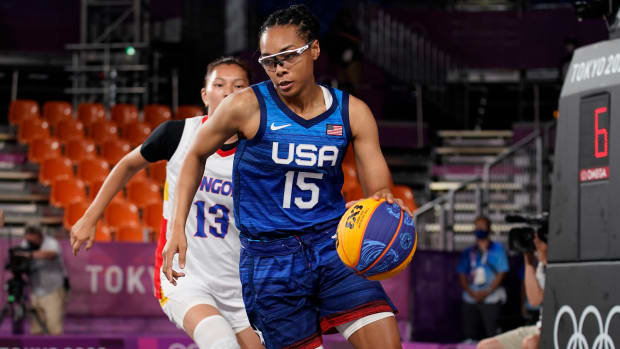
All statistics of 2022 Women's World Basketball Championship can be viewed here .
Click and subscribe to the Olympics Telegram channel to be the first to know about your favorite athletes and major sporting events.
FOLLOW THE OLYMPIAD. STAY UP TO EVERYTHING.
Free live sports broadcasts. Unlimited access to episodes. Unique news and events of the Olympics
Register here Register here
Melbourne 1956 Summer Olympics
DateNovember 21 - December 8
CountryAustralia, Sweden
Athletes3314
Teams72
Competitions151
Melbourne 1956 Official Film | 1956 OlympicsOfficial FilmsRon Clark Lights the Flame of the 1956 GamesMelbourne 1956Bobby Morrow Takes Three Golds in Melbourne 1956Melbourne 1956Olympics 1956: "Blood in the Pool"Melbourne 1956Da Silva Wins Gold in Melbourne 1956The Olympics On the Record
About the Games 9006 Olympic Capital
In the 1956 Olympic Capital election, Melbourne beat Buenos Aires by just one vote.
Confrontation of the greats
Alain Mimoun lost to Emil Zatopek in three race distances, but won a confident victory over the Czech in the marathon. The Frenchman waited at the finish line for his old friend and rival, who took sixth place.
Complete dominance
The US basketball team remains one of the most dominant teams in Olympic history. The team, in which KC Jones and Bill Russell shone, in total scored more than twice as many points as their opponents. She won all matches by at least 30 points.
A symbol of unity
Until 1956, delegations went alphabetically by country at the opening and closing ceremonies. However, in Melbourne, at the suggestion of the young apprentice carpenter John Ian Veen, at the closing ceremony all the athletes walked in one group - as a sign of world unity.
NOC: 72
Athletes: 3314 (376 women, 2938 men)
Medal sets: 145
Volunteers:
009
Hospitable Oceania
For the first time in history, the Olympic Games were held in Oceania.
Equestrian in Stockholm
To avoid problems with the long quarantine of horses imported into Australia, the Olympics were held in two cities (Melbourne and Stockholm), in two countries (Australia and Sweden), on two continents (Oceania and Europe) and even in different seasons (November and June). This is the only case in Olympic history when the principle of unity of time and place of the competition was violated.
Two Germanys under one flag
The International Olympic Committee has achieved great political success by uniting athletes from West and East Germany in the United German Team. She performed under a black-red-yellow flag with the image of the Olympic rings. The hymn was the ode "To Joy" from Beethoven's 9th symphony. The same approach was used in the next two Olympics.
The first boycott
The entry of Soviet troops into Hungary provoked protests from a number of Western European countries. Because of this, Spain, Switzerland and the Netherlands refused to participate in the Olympics.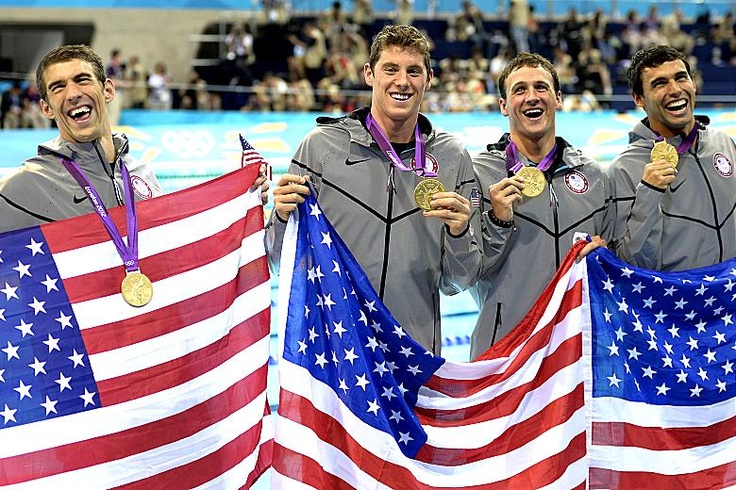 Egypt, Lebanon and Iraq withdrew from the competition amid the Suez Crisis. The People's Republic of China did not go to the Olympic Games because of the participation of the Republic of China (Taiwan) in them. The resolution of this conflict took 28 years.
Egypt, Lebanon and Iraq withdrew from the competition amid the Suez Crisis. The People's Republic of China did not go to the Olympic Games because of the participation of the Republic of China (Taiwan) in them. The resolution of this conflict took 28 years.
New technologies
Foil fencing was the first to use an electric hit fixer, and a semi-automatic digital scoreboard appeared in swimming.
Ceremonies
Melbourne, November 22, 1956. The opening ceremony. Lighting the Olympic flame.
Official Opening of the Olympics
Duke Philip of Edinburgh
Lighting of the Olympic Flame
Ron Clark (Athletics)
Athletes' Olympic Pledge
John Landy (Athletics)
Olympic Referees Oath
The Referees Oath at the Summer Olympics was first taken in 1972 in Munich.
Medal standings
All teams, all medals.
View
Results
Melbourne-1956
Athletes
All athletes
Soviet Union
Hungary
0009 Soviet Union
Paul Elvström defends his title | Melbourne 1956
Melbourne 1956Melbourne 1956
Discover the Games
Brand
Each Olympic Games has its own visual concept.
